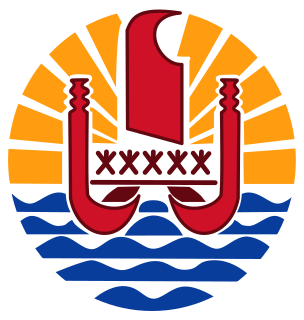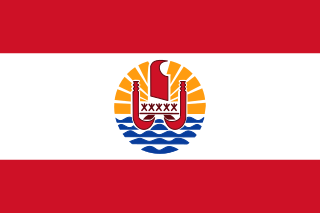
Tahiti (; French pronunciation: [ta.iti]; previously also known as Otaheite is the largest island in the Windward group of French Polynesia. The island is located in the archipelago of the Society Islands in the central Southern Pacific Ocean, and is divided into two parts: the bigger, northwestern part, Tahiti Nui, and the smaller, southeastern part, Tahiti Iti. The island was formed from volcanic activity and is high and mountainous with surrounding coral reefs. The population is 189,517 inhabitants, making it the most populous island of French Polynesia and accounting for 68.7% of its total population.

The Marquesas Islands are a group of volcanic islands in French Polynesia, an overseas collectivity of France in the southern Pacific Ocean. The Marquesas are located at 9.7812° S, 139.0817° W. The highest point is the peak of Mount Oave on Ua Pou island at 1,230 m (4,035 ft) above sea level.
Tahitian is a Polynesian language, spoken mainly on the Society Islands in French Polynesia. It belongs to the Eastern Polynesian group.

Oscar Manutahi Temaru is a French politician. He has been President of French Polynesia, an overseas collectivity of France, on five occasions: in 2004, from 2005 to 2006, from 2007 to 2008, in 2009, and from 2011 to 2013 and mayor of Faa'a since 1983.

Gaston Flosse is a French politician who has been President of French Polynesia on five separate occasions. He is currently a member of the Senate of France and has been a French junior minister under Jacques Chirac. He received sentences for corruption, which are under appeal.

Elections for the Assembly of French Polynesia, the Territorial Assembly of French Polynesia, were held on May 23, 2004.

Mahina is a commune in the suburbs of Tahiti in French Polynesia, an overseas territory of France in the Pacific Ocean. Mahina is located on the island of Tahiti, in the administrative subdivision of the Windward Islands, themselves part of the Society Islands. Mahina is the 5th most populous commune in French Polynesia with a population of 14,764, in an area of 52 km2. Mount Orohena is a nearby mountain.

Édouard Fritch is a French politician and has been President of French Polynesia since September 2014. Previously he has served as the Speaker of the Assembly of French Polynesia on three occasions: from April 2007 to February 2008, from February 2009 to April 2009 and from May 2013 to September 2014. Fritch was co-President of Tahoeraa Huiraatira, a pro-French political party, until 2016.
MonsignorMichel-Gaspard Coppenrath was the Tahitian Archbishop of the Roman Catholic Archdiocese of Papeete in French Polynesia for 26 years from 1973 until 1999. Coppenrath continued to serve as the Archbishop Emeritus of the Roman Catholic Archdiocese of Papeete from his 1999 until his death in 2008. Coppenrath was the first Tahitian-born Catholic bishop of French Polynesia.

This page list topics related to French Polynesia.
Adolphe Colrat is a French civil servant who served as the French High Commissioner of the Republic in French Polynesia from 2008 to 2011. He succeeded Anne Boquet in the post.

The Tahitians, or Maohis, are a nation and Polynesian ethnic group native to Tahiti and thirteen other Society Islands in French Polynesia, as well as the modern population of these lands of multiracial, primarily Polynesian-French, ancestry. The Tahitians are one of the largest indigenous Polynesian ethnic groups, behind the Māori, Samoans and Hawaiians.

Pouvanaa a Oopa was a French Polynesia politician and Tahitian nationalist, who led a Tahitian separatist movement against French rule, before being exiled to France in the late 1950s.

Marcel Pouvanaa Oopa was a Tahitian politician, the son of the Tahitian leader Pouvanaa a Oopa. He belonged to the political party Democratic Rally of the Tahitian People (RDPT), led by his father. Marcel Oopa was a carpenter by profession.

An indirect presidential election was held in French Polynesia on Tuesday 24 November 2009, after the opposition, led by Gaston Tong Sang, won a vote of no confidence against the government of incumbent French Polynesia President Oscar Temaru.

Vaitape is the largest city of Bora Bora Island in French Polynesia. It has a population of 4,927, about half of the island's population which is about 9,000. It is located about 130 mi (210 km) northwest of Papeete, the capital of French Polynesia. The main language of Vaitape is French, although 20 percent of the population speaks Tahitian.
Internal Autonomy Day is an official holiday in French Polynesia, an overseas collectivity of France. It is celebrated annually on 29 June, to honor Tahitian and French Polynesian self-rule. The day also marked the annexation of the Kingdom of Tahiti and the turnover of native sovereignty by King Pōmare V to France.

















